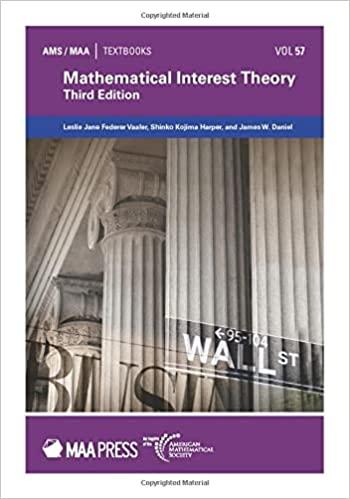Question
Suppose we are playing a simple collectable card game (e.g. like Hearthstone, or Magic the Gathering). In this game, each player has a card deck
Suppose we are playing a simple collectable card game (e.g. like Hearthstone, or Magic the Gathering). In this game, each player has a card deck which contains 30 cards (with no duplicate cards). At the start of this game, both players shuffle their decks. Then the player going first draws five cards, and the player going second draws six cards. After this, the game starts, and players alternate turns. Each player draws an additional card at the start of their turn. So, for example, after their third turn player one should have drawn eight cards in total (the 5 cards they started with, plus another three cards over three turns). Player two should have drawn nine cards in total after their third turn. For the following questions, suppose there is a special combination of five cards, and if you have those five cards in your hand you instantly win the game.
A bit of help As a little hint for some of the questions below, you're reminded that if you have some product , we can express this as n (n 1) (n 2). . . (n k) n!/(n k 1)! n(n 1)(n 2)(n 3). . . (n k) = n! /(n k 1)!
Question 1.a What is the probability that the first player will draw this combination on their first turn and win the game immediately? What about the second player?
Question 1.b What is the probability that the five cards required for victory are all at the bottom of a player's deck (i.e. they are the last five cards in their deck)?
Question 1.c Suppose a player has drawn 15 cards from their deck. What is the probability that all of the cards in the winning combination are still in their deck?
Question 1.d Suppose a player has drawn cards from their deck, where is between 0 and 30. What is the probability that all of the cards in the winning combination is still in their deck (i.e. that they have not drawn any piece of the winning combination yet) in terms of ? You might like to verify your previous answers with your formula, but this is not required.
Step by Step Solution
There are 3 Steps involved in it
Step: 1

Get Instant Access to Expert-Tailored Solutions
See step-by-step solutions with expert insights and AI powered tools for academic success
Step: 2

Step: 3

Ace Your Homework with AI
Get the answers you need in no time with our AI-driven, step-by-step assistance
Get Started


